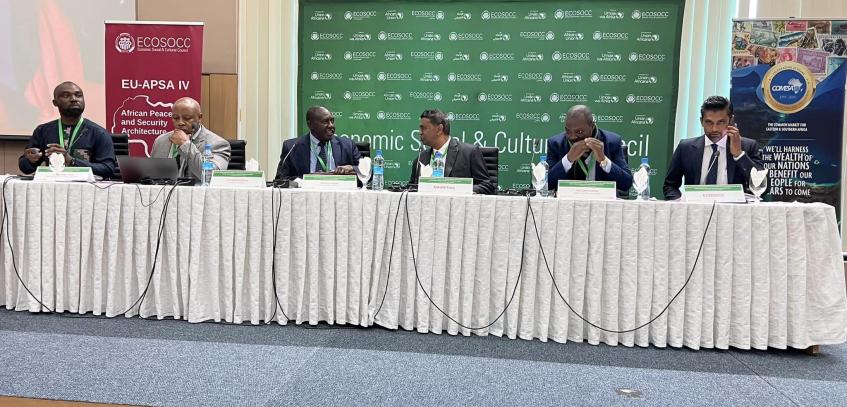The Economic, Social and Cultural Council (ECOSOCC) is holding a high-level multi-stakeholder dialogue on Civil Society Organisation engagement with the African Union (AU) on the European Union (EU) Support Programme on the African Peace and Security Architecture (APSA).
The meeting is attended by members of the AU Permanent Representatives Committee (PRC), members of ECOSOCC, African Union Commission staff, and staff of COMESA.
The overall objective of the meeting is to facilitate a high-level multi-level dialogue with AU member states, CSOs, and peace and security experts, in order to enhance civil society contributions to conflict prevention, crisis management, and post-conflict reconstruction and development.
In particular, the meeting will increase CSOs' knowledge of the mechanisms put in place to fortify their engagement with the AU, as well as their participation in AU programmes related to conflict prevention, management and resolution, democracy, governance, constitutionalism, the rule of law, human rights, and transitional justice.
The meeting is further expected to bridge the gap between the AU and CSOs; and build on the expertise and capacities of CSOs in conflict prevention, crisis management, and post-conflict reconstruction and development.
Opening the meeting, Dr. Dharmraj Busgeeth, Ambassador Extraordinary and Plenipotentiary of the Republic of Mauritius to Ethiopia and the Federal Democratic Republic of Ethiopia, commended ECOSOCC for convening the meeting and assured ECOSOCC of the support from the AU’s PRC and in particular, Mauritius in the roll out of its initiatives and programs.
ECOSOCC Presiding Officer, Mr. Denise Kodhe in a keynote address called on delegates to support the Organ in carrying out its mandate in enhancing CSO’s capacity in engaging with the African Union.
He further urged African CSOs to support and advise African leadership on issues affecting the continent.
ECOSOCC Head of Secretariat, Mr. William Carew commended African CSOs for positioning themselves as key actors and partners in mitigating violence, and facilitating the conditions necessary for building sustainable peace in Africa.
“This is why ECOSOCC is ever committed to the full implementation of the Livingstone Formula and Maseru Conclusions, especially in light of the EU-APSA IV Project, because in addition to the actualization of Agenda 2063, the successful implementation of this project will also serve to position ECOSOCC as a viable and reliable stakeholder at all stages of conflict prevention, management, and resolution in Africa,” he said.
Mr. Carew gave an overview of the work that ECOSOC has embarked on including, producing policy related documents like policy opinions and policy booklets; civil society toolkits and manuals to build the capacity of African CSOs to operate effectively as developmental partners of the African Union.
So far ECOSOCC has produced over 25 policy related outputs like, Policy Manuals and Toolkits on: Monitoring Agenda 2063 at the national, regional and continental level and Strategic planning for civil society organizations; The conduct of advocacy within African civil society and Fundraising for Civil Society Organizations.
Others include the development of a new Strategic Plan for ECOSOCC and Research and Policy Studies on: “Assessing the impact of COVID-19 Response measures on women and girls in Africa; Research Study on “Civil Society and the AFCFTA: Consolidating African Integration in the new single market; Research Study On “Civil Society as Partners In Emergency Response – The Case of COVID-19,”: Research Study on Government-Civil Society Relations in Africa: Building a more constructive partnership and Fatally misinformed: Examining the role of social media misinformation on COVID-19 and lessons for future emergencies.
Further, ECOSOCC is currently finalizing the development of legal and operational frameworks in pursuance of the relevant decisions of the AU’s Executive Council relating to the establishment of ECOSOCC National Chapters, the establishment of an accreditation mechanism for African CSOs, and modality for the engagement of the African Diaspora in the operationalization of ECOSOCC.
Mr. Raymond Kitevu, Conflict Early Warning Expert - Governance, Peace and Security, from the Common Market for Eastern and Southern Africa (COMESA) reiterated COMESA’s commitment to the peace and security initiatives and highlighted the importance of the meeting to bridge the gap with CSOs and enhance engagement with them.
ECOSOCC, as the AU's civil society Organ, has been instrumental in expanding the space for CSOs in various thematic areas, particularly in the area of peace, security, governance and human rights.
Within the scope of the Organ's mandate, ECOSOCC has established a platform for CSOs to participate in efforts to promote peace, security, stability, good governance, and protect human rights in Africa. Article 8, sub-articles 10, 11, and 20 of the AU’s Peace and Security Council (PSC) Protocol, as well as the Livingstone Formula and the Maseru Conclusions — all of which are important components of AU Agenda 2063's Aspiration 4, which envisions a peaceful and fully functional and operational African Peace and Security Architecture (APSA) — to guide ECOSOCC's initiative to strengthen CSOs capacity in these areas.





